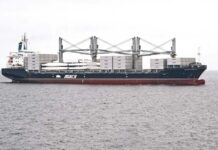
Sea-Intelligence has published a Global Liner Performance (GLP) report for schedule reliability, showing moderate results for the majority of the container shipping lines.
The report covers schedule reliability across 34 different trade lanes and more than 60 carriers.

Schedule reliability improved marginally in September 2021 by 0.6% to 34%, maintaining the range of 34% – 40% seen throughout the year, according to Sea-Intelligence data.
The schedule reliability is not plummeting further and this is the only positive sign of this report, said the Danish analysts.
On a year-on-year level, schedule reliability in September was down by 22% points.
“The average delay for late vessel arrivals also improved marginally, dropping to 7.27 days, albeit still the highest figure for this month, which has been a theme throughout 2021,” noted the report.

Maersk Line was once again the most reliable top-14 carrier in September, with schedule reliability of 44.2%, followed by its subsidiary Hamburg Süd with 37.3%, according to the analysis.
Another two carriers had schedule reliability between 30% – 40%, with only four carriers recording schedule reliability between 20% and 30%. Six carriers had schedule reliability of under 20%, with Evergreen recording the lowest one for September 2021, reaching just 11.7%.
Six carriers recorded a month-on-month improvement in schedule reliability, while no carrier recorded a year-on-year improvement, with all carriers except Maersk, recording double-digit year-on-year declines of over 20%.





